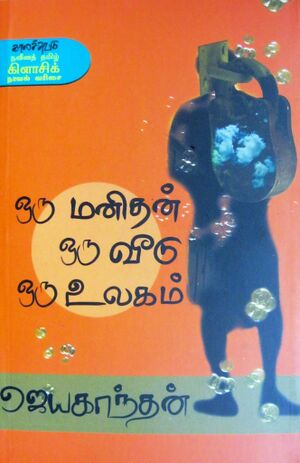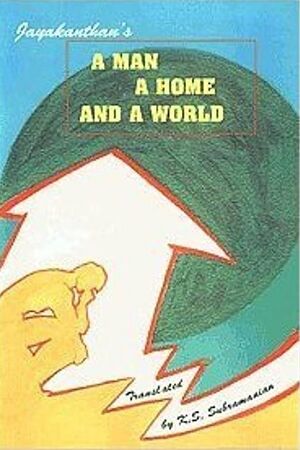Oru Manithan Oru Veedu Oru Ulagam (novel)
இந்தப் பக்கத்தை தமிழில் வாசிக்க: ஒரு மனிதன் ஒரு வீடு ஒரு உலகம்
Oru Manithan Oru Veedu Oru Ulagam (1973), is a novel written by Jayakanthan, is set with the backdrop of the hippie movement and depicts a character named Henry, who lives his life on his own terms, without any restraints, inhibitions or great ambitions. Henry became popular for his nature which was a combination of the renunciation aspect of Indian ascetics and the element of freedom borrowed from the Hippie culture.
Creation, Publication
Oru Manithan Oru Veedu Oru Ulagam was serialized in Ananda Vikatan in 1972. It was published as a book in 1973 by Meenakshi Puthaka Nilayam. This novel is the first part of a great novel that Jayakanthan intended to write. Jayakanthan stopped the story and announced that he would write the second part later in Vikatan magazine. He also thanked Ananda Vikatan for allowing him to stop in the middle and asked them to consider the first part as a complete work in itself. He did not, however, finish the second part of the novel.
Synopsis
The novel tells the story of a young man named Henry and how he came to his father's hometown Krishnarajapuram and renovated his old house. Henry, a young Anglo-Indian man from Bangalore, arrives at Krishnarajapuram by Duraikkannu's truck accompanied by Devarajan, who offers to let Henry stay at his house. The dilapidated house, opposite to Devarajan's house, belonged to Henry's father. Upon learning that his wife had an affair with a barber, Henry's father left town. And the barber hanged himself in front of the house.
Henry tells Devarajan who his father was and that he does not want the property, but just to see his father's hometown. But Devarajan, who is Henry's uncle, insists that the property belongs to Henry. Henry accepts and starts renovating his house. Devarajan and Duraikannu discuss the marriage of Henry after he settles down in his house. A nude, mentally ill woman named Baby shows up and helps them with the house warming ceremonies. She wears the dress Henry gives her. Henry hopes to keep her there but she disappears. The house remains open, waiting for her return.
Characters
- Henry - A young Anglo-Indian man
- Baby - the mentally ill woman
- Driver Duraikkannu - Henry's uncle
- Devarajan - A school teacher in Krishnarajapuram
- Kanagavalli - Devarajan's wife
- Maniyakkara Ramasamy Gaunder - Munsiff
- Nagammal - Munsiff's wife
- Palani - A mad barber
- Kanagasabai Mudaliar - Superintendent of the town's temple.
- Natarajan - Post Office Iyer
- Desigar - Tea shop owner
- Pakiri - Bicycle shop owner
- Sabapathy - Henry's father
- Navaneetham - Duraikannu's wife
- Panchavarnathammal - Duraikannu's mother-in-law
- Kanniyappa Nayakkar - house builder
Literary Significance
Henry is considered to be the pinnacle of characterization in fifty years of Tamil literary history. Similar nomadic characters created later have been termed as a "Henry". Henry does not belong anywhere, is full of compassion, uneducated and loves all people. The people of Krishnarajapuram are all compassionate and in live harmony with each other. It is an ideal village. Henry comes to this village and falls in love with a mad woman named Baby. Her leaving him shows that she exists, like a natural being even more detached than Henry, who had adopted few constraints as he starts his life in the village. This novel is one of the achievements of Tamil literature as it explores the conflicts between the secular ideals of a model village, Henry's nomadic ideals and Baby's pure ascetic traits.
Translation
- A Man, A Home and A World (2003) Translated by K.S. Subramanyan.
Links
- Oru Manithan Oru Veedu Oru Ulagam, Jeyakanthan
- Jeyakanthan's novel 'Oru Manithan Oru Veedu Oru Ulagam', a perspective
- Oru Manithan Oru Veedu Oru Ulagam, Jeyakanthan - Rengasubramani
- Oru Manithan Oru Veedu Oru Ulagam, Jeyakanthan - Ayyanar Vishvanath
- Oru Novel Narpadhuaandugal, Jeyamohan
✅Finalised Page


